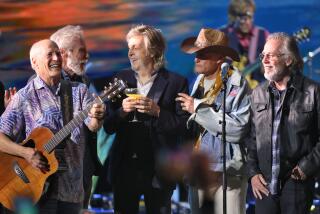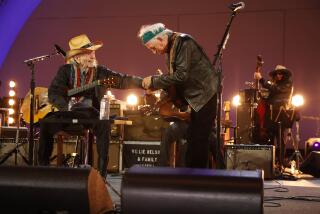A MODERN JOSHUA : Did Big Jay McNeeley Blow Down the Berlin Wall
- Share via
Big Jay McNeeley isn’t particularly worried about the outcome of the Battle of the Saxes he’s participating in with Chuck Higgins on Friday, July 27 at the Saddleback Inn. He’s been in scores of reed skirmishes since the 1940s, and for years, McNeeley claims, his supremacy has been “a determined factor. It’s obvious who won.”
The 63-year-old sax man may not be shy about touting his own abilities, but his estimations seem downright modest compared to some of the write-ups he’s had. The current issue of the nostalgia mag Sh-boom wrote of a show McNeeley played in Berlin the night the wall came down last year, noting, “It was difficult to tell if the pandemonium inside the club was any less than the jubilation atop the wall a few blocks away.” A German review went farther, calling McNeeley “a modern Joshua” and suggesting that his tenor sax had blown the wall down.
In Europe, where there is a respect for American musical history, McNeeley is esteemed for his 1949 No. 1 R&B; hit “Deacon’s Hop” and such lively titles as “Jet Fury,” “3-D” and a ’53 single whose A and B sides were “Catastrophe” and “Calamity.”
The early ‘50s were the era of honking, garishly attired sax heroes, including his Battle of the Saxes opponent Higgins, whose ‘50s titles included “Pachuco Hop,” “Motor Head Baby,” “Greasy Pig” and “Eye’ball.”
Speaking of Friday’s sax standoff, a benefit for the county homeless, McNeeley said: “We’re trying to bring something back that a lot of people haven’t seen in a long time. We have a lot of old fans that like this, and new ones who have never seen anything like it. We really entertain the people.”
“I’m the father of all this stuff, you know,” McNeeley maintains. “Those guys really came after me. I was the one who started all the honkin’ and screamin’ and layin’ on the floor and hollerin’ and all.”
The Watts-born McNeeley began his career as a jazzman, sharing the stage, he said, with the likes of Charlie Parker, Dizzy Gillespie, Sonny Criss and Miles Davis.
“Yes, I started playing jazz, but then I started thinking I wanted to make some money,” he said with a laugh. “So I thought, ‘Where do I fit into the program?’ and started doing the showmanship.”
Initially he just liked marching through audiences while he played. He recalls one show at Chicago’s Wrigley Field where he and Lionel Hampton’s band wound up crawling around the infield on all fours.
The floor-rolling began in 1951 in Clarksville, Tenn. “After we played for the first hour there was no response from the people. I got on my knees and nothing happened, so I thought, ‘Nothin’ to do but roll on the floor.’ I did that, and it really caught people’s attention. It broke the spell. So I said, ‘Hey, I’m going to try this when I get to Texas!’ It went over big there, so I kept it in the act.”
When others began copying his antics, McNeeley was moved to paint his sax with fluorescent paint. “They’d turn out the lights, turn on a black light, and my sax was all anybody could see. I used that very effectively through my travels.”
Those who have seen McNeeley’s recent club appearances, or his floor-dusting bit of showmanship on the 1987 Grammy broadcast, know that he stays in shape and still puts on a honking wild act. He continues to add new flash to his playing by way of electronic effects.
“I have synthesizers, an SPX90 (a digital processor), echo delays, an octave box, pitch change, chorus. I’ve got a wireless where I walk all through the audience. We opened up for this big electric band in Germany, and we put a hurtin’ on them. They think, ‘small band--puny small sound.’ Then we surprise them.”
But it wouldn’t be sporting to whip out all this technology in a sax battle, would it?
“Oh, yeah, I’m going to hit him with everything. In fact I just got a new wireless that lets me activate my effects with it while I’m walking. You have to keep up to date. You realize my first record was in 1949, 40 years ago. A lot of players still sound like they’re playing back then.”
In the mid-’60s McNeeley found that his gigs were drying up in the wake of Beatlemania, and he left the business, not returning until 1983. Though the job prospects in his native state still aren’t ideal, like many of his peers he has found a warm welcome overseas.
“If I wanted to I could work 365 days a year in Europe. It’s great. They make you feel the way musicians used to feel. Like when Duke or Basie and the guys would come to town, they were treated like they were doctors and lawyers. They had that deep respect for them. It’s still like that there today.
“They know all about you. It’s like they carry a library around with them. They want to know who played on this record, every little thing. Their enthusiasm is incredible. There was one guy in Frankfurt who had paid 440 marks for one of my records. That’s $240! It’s amazing how different it is in Europe. People get a lot of attractions--it’s not like they’re hungry. They’re just very enthusiastic.”
A couple of years ago he found that some of his biggest fans were living on the other side of the Berlin Wall.
“I went as a tourist into East Berlin and was introduced to this couple who had bought my first record 40 years ago. I had dinner with them and they showed me all around East Berlin. It was real sad because as much as they wanted to, they couldn’t get out to hear me play.
“Then the second time I was there, we were playing in a club called Quasimodo’s, and the Wall came down around 11 p.m. It was incredible. We had to walk back to where we were staying. There was no way to drive because everybody was in the streets celebrating.
“Then when I was playing there this year, my friends from East Berlin were sitting right in front. After all these years they finally had a chance to groove with us.”
McNeeley has two albums due out shortly. One will be a German-release funk-based live set. “It’s called ‘Big Jay Blows the Wall Down.’ It’s got a great album cover, where it looks like I’m coming through the wall at ya.” He also has a country album in the can geared for domestic release. “I do ‘I EECan’t Stop Loving You’ and ‘There’s Something on Your Mind’ (his biggest ‘50s hit) country style. I play some wild sax like in the ‘50s. I’m very pleased with it.”
Though he’s near the mandatory retirement age for many businesses, McNeeley has no immediate plans to hang up his sax.
“I felt good on this European trip and I’m looking forward to the next one. I just worked with Cab Calloway, and he’s 83, and he sounds just as good as he did 40 or 50 years ago. He had a bunch of young cats and they were cooking. Who knows, I may go another five or seven years.
“We did an encore at this last European festival that lasted a whole hour, after an hour-and-a-half show. That’s how much enthusiasm was going. Every time we’d try to get off, people would call us back. I’ve still got a lot of energy for the music.”
Who
Big Jay McNeeley.
When
Friday, July 27, 8 p.m.
Where
The Saddleback Inn, 1660 E. 1st St., Santa Ana. McNeeley is playing a “Battle of the Saxes” against saxophonist Chuck Higgins to benefit the homeless.
Whereabouts
Santa Ana Freeway to the 1st Street exit in Santa Ana. The Saddleback Inn is one block west of the freeway.
Wherewithal
$15 to $16.50.
Where to call
(714) 542-8425.
More to Read
The biggest entertainment stories
Get our big stories about Hollywood, film, television, music, arts, culture and more right in your inbox as soon as they publish.
You may occasionally receive promotional content from the Los Angeles Times.










